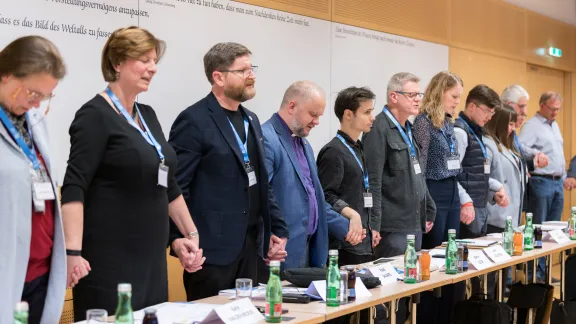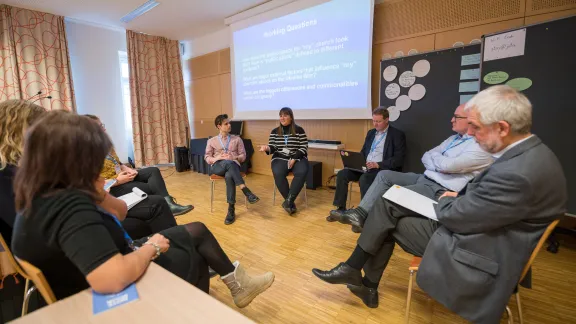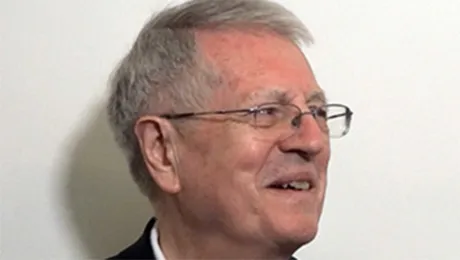
In war-torn Europe, LWF member churches reflect on peace, justice and reconciliation. Opening prayer is observed as representatives from Lutheran churches across Europe gather under the theme ‘Churches Reflecting Together: Peace, Justice, and Reconciliation in Times of War’.
LWF European member churches meet in Austria to discuss theological and practical responses to the war in Ukraine
(LWI) - Over 1,000 days of full-scale war in Ukraine have seen The Lutheran World Federation (LWF) member churches impacted deeply, not only in terms of diaconal responses, but also in how the conflict challenges theological approaches to issues of war and peace.
Inside Ukraine and across Europe, Lutheran churches have responded in myriad ways to support people in need. These include parish houses opened for accommodation, food preparation, language teaching, community centers developed, psychosocial support offered, humanitarian efforts provided through cash assistance, bomb shelter construction and renovation.
But a war that has shaken the stability of the European region in a way not seen in decades, has also brought to the fore a need for joint reflection about the churches’ understanding of their role and mission, and the core theological understandings that guide their ministry in times of war.
This week in Vienna, Austria, 44 representatives from member churches across LWF’s three European regions gathered for a three-day consultation to address these issues, held under the theme of “Churches Reflecting Together: Peace, Justice, and Reconciliation in Times of War.”
Existential questions of survival and war
Founded in the aftermath of World War II, the LWF remains unique as a global church body, holding under the same roof humanitarian work on the one side and church relations, theology, mission, witness and service as a global communion of churches on the other. It is therefore well placed to provide a safe space for dialogue on such pivotal theological concerns for our time.
In Vienna, 2-4 December, participants heard testimony from Ukraine, where the LWF is present both through a World Service country program, and its member church the German Evangelical Lutheran Church of Ukraine. Bishop Pavlo Shvarts from Kharkiv spoke about the way perspectives change, both for theology and day-to-day ministry in the face of existential questions of life and death.
Reflecting on theologies of war and of peace, Shvarts underlined the need for a highly practical approach. “It is easy to say ‘I am pacifist’, when you live far from a war. It looks quite different when rockets are hitting your own house,” he said. He pointed out that during all five years of ministry as a bishop, he has been serving in a crisis situation. “This sounds very sad, but it actually gives me much inspiration, because it shows how God blesses us in crisis situations,” he said. "For me it is a privilege to serve our people even as any one of us may die tomorrow. Any minute, any hour I spend with such a person, is not in vain for me,” he reflected. ‘
Understanding peace in our time
Participants explored questions including the changing face of pacifism, and how Lutheran theology can contribute to the construction of just and peaceful societies. Prof. Dr Petr Kratochvíl from the Centre for European Politics at the Institute of International Relations in Prague (Czech Republic) spoke about the positioning of the churches, noting that “we tend to think about our positions in absolute terms, [yet very often] our positions are always contingent with the times in which we live, and we need to reflect on where our positions and our ideas were born, in what time, and in what world.”

Cross regional conversation underway in Vienna at the Consultation convened by the LWF. Photo: LWF/A. Hillert
This consultation has been a starting point, to listen to where we are as churches at this time, and to discern a direction for how to move forward together as a communion in the years to come
Rev. Dr Ireneusz Lukas, LWF Regional Secretary for Europe
In a theological analysis, Research Assistant Nicole Kunkel from Humboldt University of Berlin (Germany) reflected on the definitions of peace and justice. “We see today a clear dichotomy,” she observed, “where some people say we need an absolute pacifist approach –and they call this ‘just peace’ –and we have the opposite, of people saying we need a full-scale nuclear approach –and they call that a ‘just peace'.”
Prof. Dr Katharina Kunter, Professor for Contemporary Church History at the University of Helsinki (Finland) Faculty of Theology, noted that “our concept of peace is historically and contextually constructed,” adding that churches need to be careful in the language they use “in speaking to the wider world.” In the ecumenical movement, she noted, the concept of ‘just peace’ is often taken to mean something very specific, but this is not necessarily so understood in the wider public space.
“And if we look ahead, it is quite likely in the end that for Ukraine, we may get to witness the most unfair and unjust peace we have seen in many decades, ... where the country may have to give up territory now occupied by Russia. And if this is coming true, what will churches say to that?” she asked.
‘Study process on peace ethics
The process of theological reflection on Lutheran peace ethics in the face of current global challenges of conflicts and wars is about to be deepened over the next few years, with a formal study process mandated by the LWF Thirteenth Assembly about to unfold.
Among the many questions on the table in Vienna, LWF Program Executive for Global Lutheran Theology Rev. Dr Eva Harasta pointed to Martin Luther’s reflections on the Lord’s prayer, and in particular the words 'Thy will be done’. “Speaking of that heavenly peace that we all long for, it is not something completely separate from us. God’s will, will happen with or without us, but nonetheless we pray that it may happen in part with us and through us, and there is a connection there, in hope and in faith,” she recalled.
Rebekka Meissner, LWF Program Executive for Member Church Projects, reflected that the consultation offered space for respectful and honest sharing of the approaches and experiences of churches across Europe, an aspect she described as important not least in view of the diverse histories and realities of churches in the region.
“This consultation has been a starting point, to listen to where we are as churches at this time, and to discern a direction for how to move forward together as a communion in the years to come,” LWF Regional Secretary for Europe Rev. Dr Ireneusz Lukas concluded.


